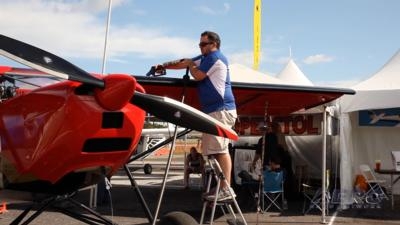Mon, Apr 22, 2024
Inquiry Was Sparked By the University of North Dakota (UND) Aviation Program's Experience
In a significant development impacting piston-engine aircraft operations, Lycoming Engines has released an update on its investigation into valve seat recession observed in engines using UL94 fuel.

The inquiry was sparked by the University of North Dakota (UND) Aviation program's experience after switching its fleet to UL94, a 94-octane unleaded fuel, in June 2023. Despite initial positive outcomes, UND detected abnormal valve seat recession after logging 46,000 flight hours with the new fuel, prompting a return to the traditional 100LL avgas in October.
Lycoming's root cause analysis revealed that while the engine and airframe components meet specifications and are unlikely contributors to the issue, the characteristics of UL94 under certain operational conditions could indeed influence valve seat durability. Key findings suggest that the aromatic concentration in UL94, although not currently regulated by ASTM D7547--the standard specification for hydrocarbon unleaded aviation gasoline--may affect engine valve seats. Higher aromatic levels can alter flame speed and increase particulate abrasiveness, subsequently accelerating valve seat wear.
Responding to these findings, Lycoming is collaborating closely with the FAA to examine how different piston engines respond to variations in fuel aromatics. This partnership aims to refine fuel standards and provide clearer guidelines for aircraft operators on managing fuel use, particularly how leaning techniques could mitigate potential issues associated with high aromatic concentrations.

This investigation is part of Lycoming's commitment under the FAA's Eliminate Aviation Gasoline Lead Emissions (EAGLE) initiative. The project seeks to replace leaded avgas with a high-octane unleaded alternative by 2030, ensuring a safer and more environmentally friendly future for aviation. Through continued research and industry collaboration, Lycoming aims to enhance fuel formulations to prevent mechanical issues and support the aviation sector's transition to unleaded fuels.
More News
Option Approach An approach requested and conducted by a pilot which will result in either a touch-and-go, missed approach, low approach, stop-and-go, or full stop landing. Pilots >[...]
"Emirates is already the world's largest Boeing 777 operator, and we are expanding our commitment to the program today with additional orders for 65 Boeing 777-9s. This is a long-t>[...]
(Pilot) Reported That There Was A Sudden And Violent Vibration Throughout The Airplane That Lasted Several Seconds Analysis: The pilot was returning to his home airport at an altit>[...]
“This recognition was evident during the TBMOPA Annual Convention, where owners and operators clearly expressed their satisfaction with our focus on customer service, and enc>[...]
Overhead Maneuver A series of predetermined maneuvers prescribed for aircraft (often in formation) for entry into the visual flight rules (VFR) traffic pattern and to proceed to a >[...]
 ANN's Daily Aero-Term (11.19.25): Option Approach
ANN's Daily Aero-Term (11.19.25): Option Approach Aero-News: Quote of the Day (11.19.25)
Aero-News: Quote of the Day (11.19.25) NTSB Final Report: Sting Sport TL-2000
NTSB Final Report: Sting Sport TL-2000 Aero-News: Quote of the Day (11.20.25)
Aero-News: Quote of the Day (11.20.25) ANN's Daily Aero-Term (11.20.25): Overhead Maneuver
ANN's Daily Aero-Term (11.20.25): Overhead Maneuver




